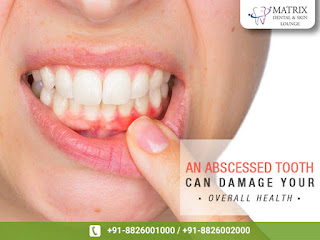The Relationship Between Bruxism And Gastrointestinal Disorders
Bruxism, also known as teeth grinding or clenching, is a condition where an individual involuntarily grinds their teeth while sleeping or even while they are awake. This condition is quite common, with estimates suggesting that approximately 10% of adults experience it. While the exact cause of bruxism is unknown, several factors can contribute to its development, including stress, anxiety, and dental problems. Dental implants in New Delhi India, dental implants cost in Delhi - MATRIX.
While bruxism primarily affects the teeth and jaws, recent research suggests that there may be a link between bruxism and gastrointestinal disorders. This blog post will explore the relationship between bruxism and gastrointestinal disorders in more detail.
Gastrointestinal Disorders And Bruxism
The link between gastrointestinal disorders and bruxism can be explained in the following structured way:
● Stress as a common trigger: Stress is a common trigger for both gastrointestinal
disorders and bruxism. When an individual experiences stress, their body
releases cortisol, a hormone that can cause muscle tension and inflammation.
This tension can lead to teeth grinding and clenching, which can exacerbate
existing dental problems and lead to further damage. Additionally, stress can
also cause gastrointestinal disorders by altering the gut microbiome and
increasing inflammation in the digestive system.
● Higher incidence of bruxism in individuals with gastrointestinal disorders: Studies have found a higher incidence of bruxism in individuals with gastrointestinal disorders. For example, a study published in the Journal of Clinical Gastroenterology found that patients with GERD had a higher incidence of bruxism than those without GERD. Similarly, a study published in the Journal of Gastroenterology and Hepatology found that patients with IBS were more likely to experience bruxism than those without IBS.
● Treating one condition may alleviate the other: Treating one condition may also help
alleviate the other. Addressing the underlying cause of bruxism, such as dental
problems or stress, may also help reduce the severity of gastrointestinal
symptoms. Similarly, treating the underlying cause of a gastrointestinal
disorder may help reduce stress levels and improve the symptoms of bruxism.
● Treatment options: Treatment for both bruxism and gastrointestinal disorders varies depending on the underlying cause and severity of the condition. For bruxism, treatment options may include wearing a mouthguard at night to prevent teeth grinding, relaxation techniques to reduce stress, and addressing any underlying dental problems. For gastrointestinal disorders, treatment options may include dietary changes, medications to reduce inflammation, and stress-reduction techniques such as meditation or yoga.
In summary, the link between gastrointestinal disorders and bruxism may be explained by stress as a common trigger. Studies have found a higher incidence of bruxism in individuals with gastrointestinal disorders, and treating one condition may help alleviate the other. Treatment options for both conditions vary and depend on the underlying cause and severity of the condition. It's important to speak with a healthcare provider if you experience symptoms of either bruxism or a gastrointestinal disorder to determine the underlying cause and develop an appropriate treatment plan.
Conclusion
While more
research is needed to fully understand the relationship between bruxism and
gastrointestinal disorders, studies suggest that there may be a common
underlying cause for these conditions. Stress is a common trigger for both
bruxism and gastrointestinal disorders, and addressing the underlying cause of
stress may help reduce symptoms of both conditions. If you experience symptoms
of either bruxism or a gastrointestinal disorder, it's important to speak with
a healthcare provider to determine the underlying cause and develop an
appropriate treatment plan.



Comments
Post a Comment